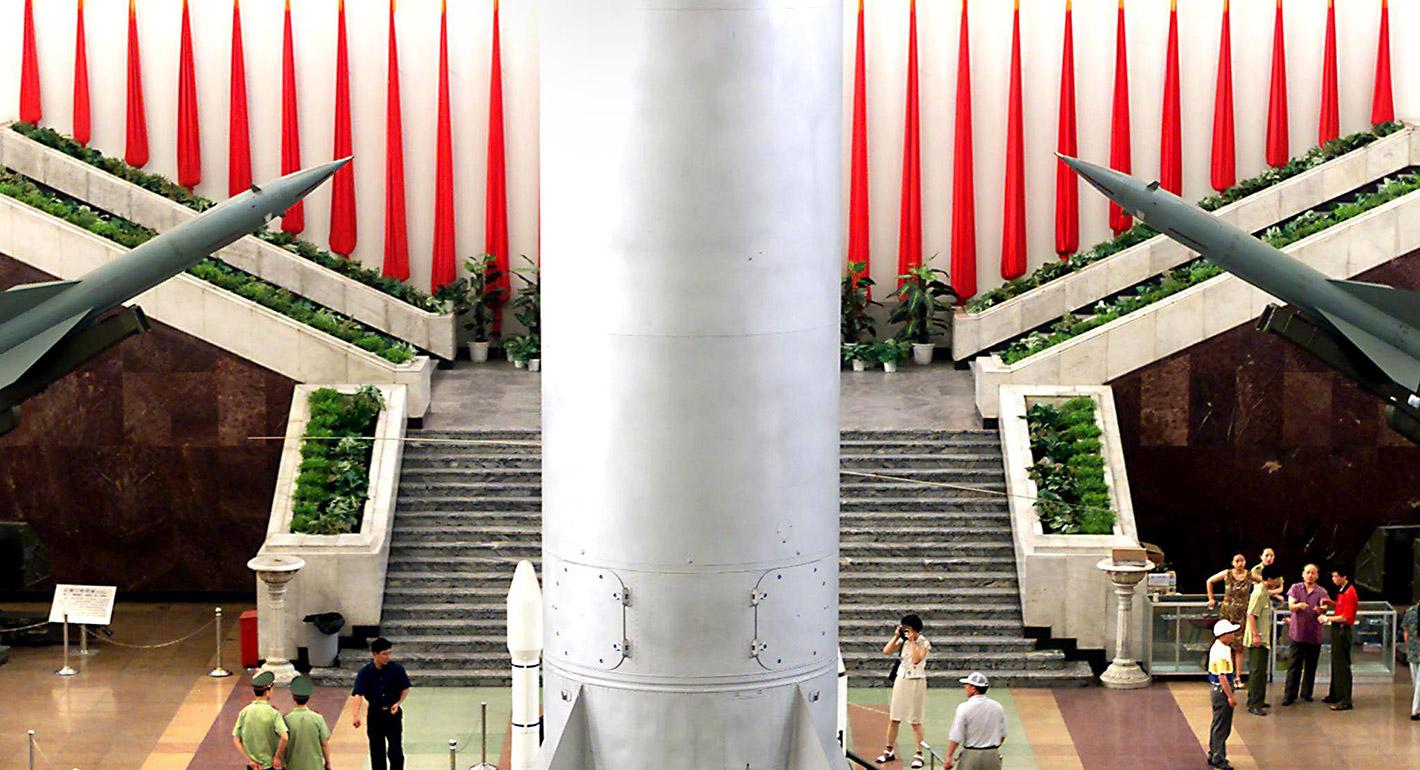As states without nuclear weapons develop nuclear-powered submarines, can NWFZ regimes adapt to manage new technical, legal, procedural, and normative challenges?
Jamie Kwong, ed., Toby Dalton, ed., Celia McDowall, ed.
{
"authors": [
"Mark Hibbs"
],
"type": "testimony",
"centerAffiliationAll": "",
"centers": [
"Carnegie Endowment for International Peace"
],
"collections": [],
"englishNewsletterAll": "",
"nonEnglishNewsletterAll": "",
"primaryCenter": "Carnegie Endowment for International Peace",
"programAffiliation": "",
"programs": [
"Nuclear Policy"
],
"projects": [],
"regions": [
"East Asia",
"China"
],
"topics": [
"Nuclear Policy",
"Arms Control"
]
}
The United States responded to Chinese nuclear espionage by sanctioning Chinese state-owned entities and including U.S. technology protection in the China-U.S. nuclear cooperation agreement. In the future U.S. nuclear industry engagement in China may decline, reflecting greater perceived risk and China’s technology indigenization.
Source: Nuclear Forces, U.S.-China Economic and Security Review Commission
I wish to thank the Commission for its invitation to speak at this hearing today. The matter that it has chosen to discuss, the role of military-civil fusion (MCF) in China’s nuclear defense, is important and timely. In these brief remarks I will outline the main points presented in my written statement that has been made available to the Commission to explain why and to what extent China’s peaceful nuclear technology development matters in considering MCF.
China began pursuing nuclear science applications seventy years ago, for both nuclear weapons and peaceful uses, the most important of which is power generation. Today there are four main reasons why China’s peaceful-use nuclear development raises questions with respect to challenges from MCF:
Facing these concerns, the United States should in my view be capable of defending its interests in competition with China given the following background:
The dual-use nature of nuclear trade has informed U.S. negotiation of a bilateral nuclear cooperation agreement with China since the 1980s. Significant nuclear cooperation by U.S. entities with China is not permitted under U.S. law outside the confines of this agreement. Centralized decision making in China concerning all nuclear activities is a longtime historical reality, not a recent development.
China is a nuclear weapon possessor state since 1964. Should China in the future expand its production of nuclear weapons, it would not require any technology or assistance from the U.S. or any other foreign state. Predictions about future Chinese nuclear weapons-building remain speculative. In any case China has sufficient weapons plutonium inventories and uranium enrichment capacity and know-how to significantly increase its arsenal of nuclear weapons without resorting to capacity additions, use of foreign-supplied technology, or the diversion of nuclear material from its nuclear power program.
A future Chinese decision to produce more nuclear weapon material, especially if production relies on technologies heretofore utilized or planned by China for electricity production, might set back its efforts to strengthen nuclear security (including in cooperation with the U.S.), and to educate Chinese scientists in foreign countries. In that regard, it is also unlikely that China would violate its bilateral agreement with the U.S. to produce nuclear weapons materials that it can make itself.
The U.S.-China bilateral agreement has since the 1990s been reviewed and amended to address emerging concerns raised by Congress about intellectual property protection and the risk of nuclear proliferation in China. Since 2015, abuse of U.S. firms’ intellectual property by Chinese entities constitutes a violation of China’s legally-binding nuclear cooperation agreement which could have consequences for China’s bilateral relationship with the U.S.
Greater focus on MCF may warrant lawmakers and Executive Branch agencies to further review the terms and implementation of bilateral trade understandings with China, including the nuclear cooperation agreement, specifically with regard to Chinese peaceful-use assurances and U.S. end-user verification for items exported to China, and for identification of China’s technology requirements (both nuclear and non-nuclear) for military nuclear applications including naval propulsion. Congress may also want to review the record of U.S.-China bilateral nuclear R&D and technology cooperation, to draw lessons regarding the national security interest.
The extent to which Chinese MCF will challenge the U.S. nuclear industry will depend on the degree of the U.S. industry’s future engagement in China’s nuclear power development. In my view, U.S. industry may be less at risk in China because it is likely to become less engaged, for two reasons: 1.) Growing perception of political and project risk in China; and 2.) Declining marginal demand by China for foreign inputs, including from the U.S., as it deploys nuclear technologies for which it claims ownership of the intellectual property. Beyond this, China’s nuclear power growth prospects may decline on margin as a consequence of policy and political red lines that China’s leadership has drawn and held since 2011 after the Fukushima nuclear accident in Japan. By 2050 China may have constructed some 250 fewer power reactors than had been anticipated during the 2000s when U.S. expectations for nuclear cooperation with China were at a peak. Especially after Fukushima, China’s central government and the CCP are fully aware that a severe accident at a nuclear power plant in China would pose an existential threat to the party and the state, because they are responsible for all strategic decision making in the nuclear technology sphere.
On balance, U.S. vigilance is warranted about MCF in the civilian nuclear sector, but compared to some other areas, nuclear cooperation may be less of a challenge because of its essential dual-use nature. The U.S. (and other states) already have fairly robust mechanisms in place to prevent nuclear cooperation that could assist the PLA because the potential for MCF is inherent in the dual-use nature of the technology.
There is so far no publicly-available evidence to support the conclusion that future Chinese nuclear power activities, including operation of fast reactors now under construction, will be directed toward its nuclear arsenal. If future Chinese capacity to produce plutonium is a concern for the United States government, it should pursue discussions to clarify China’s intentions. More generally, the U.S. government should intensify engagement with other nuclear weapons states toward the goal of nuclear arms reductions, considering the comparatively modest size of China’s nuclear weapons inventory, such to discourage China from expanding its future nuclear weapons production.
Carnegie does not take institutional positions on public policy issues; the views represented herein are those of the author(s) and do not necessarily reflect the views of Carnegie, its staff, or its trustees.
As states without nuclear weapons develop nuclear-powered submarines, can NWFZ regimes adapt to manage new technical, legal, procedural, and normative challenges?


Jamie Kwong, ed., Toby Dalton, ed., Celia McDowall, ed.
As the first states without nuclear weapons set to acquire nuclear-powered attack submarines, Australia and Brazil face new questions and challenges as they seek to responsibly manage the risks of naval nuclear propulsion.


Jamie Kwong, ed., Toby Dalton, ed.
The supposed threats from China and Russia pose far less of a danger to both Greenland and the Arctic than the prospect of an unscrupulous takeover of the island.

Andrei Dagaev
There is an urgent need to strengthen the relevant international legal frameworks if they are to protect against threats to use nuclear weapons.
Anna Hood, Monique Cormier
The Kremlin will only be prepared to negotiate strategic arms limitations if it is confident it can secure significant concessions from the United States. Otherwise, meaningful dialogue is unlikely, and the international system of strategic stability will continue to teeter on the brink of total collapse.

Maxim Starchak